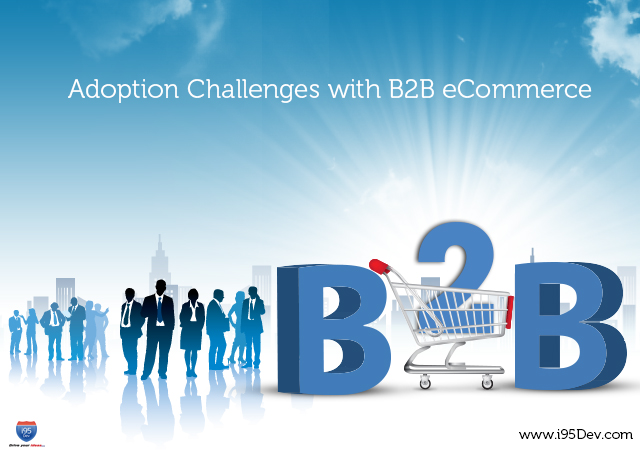In our previous articles we have looked at what B2B ecommerce is, how B2B eCommerce is different from B2C ecommerce and Features unique to the world of B2B eCommerce. In this article we will continue exploring the world of B2B eCommerce by understanding the challenges that businesses face while adopting B2B eCommerce.
B2B eCommerce is expected to reach $12 trillion in sales worldwide by 2020 (Source: Frost & Sullivan); despite this and all the benefits associated businesses have often found themselves struggling with adoption of B2B eCommerce. Almost all companies today focus only on the benefits and expect adoption to be a smooth process. Very few businesses spend time to understand the factors contributing to the resistance and address them. Identification of the right factors can help businesses to overcome or minimize the constraints in the adoption of B2B eCommerce.
The top challenges that businesses face with B2B eCommerce adoption include:
Strategic Challenges
Lack of appreciation of B2B eCommerce as a strategic issue for Business
- B2B eCommerce adoption is a strategic issue which impacts multiple stakeholders in an organization and has far reaching impact on the entire business. Despite this, it is often observed that businesses fail to associate B2B eCommerce adoption and its results with their organizational goal; which then adversely impacts the investments and priorities.
- It is also observed that B2B eCommerce adoption is often considered as an IT enabled cost cutting mechanism rather than a central strategic issue.
- Often businesses even fail to communicate the objectives of B2B eCommerce adoption at the beginning of the project; which is a shaky foundation to start on.
Lack of support from top management and other stake holders
- While most senior managers understood the importance of B2B eCommerce and supported its adoption the same was often not available from top management and other stake holders.
- Moreover, even support from the senior managers tapered off as the project progressed.
Operational Challenges
Lack of effective change management processes
- Adopting B2B eCommerce is a big step for an organization as it completely impacts the way business and day to day operations are carried out. People have to learn new technology, follow new processes and changes like these are never welcomed.
- Lack of effective communication is the most cited reason for business process and change management failures. Hence, it is important to have an effective communication strategy in place to deal with questions and uncertainty. Other reasons include user resistance, lack of proper employee consultation process, employee transition process, lack of proper training, systems usability issues, and business operational issues.
- Having an effective change manage process, which can very easily address these concerns, is critical for successful adoption of B2B eCommerce.
Organizational IT maturity
- Organizational IT maturity refers to an organization’s capability to effectively utilize its IT processes and investments to derive business value. Businesses with higher levels or organizational IT maturity are generally more effective is adopting B2B eCommerce because of the way they addressed the issues (user and system) arising from the new systems and processes.
Human Resource Challenges
Managing Stakeholder Motivation, Involvement and Participation
- Managing needs of internal stakeholders is critical to manage and maintain their motivation, involvement and participation. It is important to implement an effective change management process and involve key stakeholders from the very beginning, not just in the implementation stage. Having their buy-in from the very beginning ensures less resistance and high motivation, involvement and participation.
- It is also important to communicate both positive and negative aspects of B2B eCommerce to all stakeholders to build trust and ensure informed decision making. This kind of transparency has also been observed to go a long way in soliciting their buy-in.
Politics & Culture
- The culture and the intra-organizational politics play a big role in initiatives like B2B eCommerce adoption. The different agendas of the stakeholders involved and departmental differences between IT and sales, managers and employees, etc. were also observed to have a big impact on the adoption of B2B eCommerce; power and politics come into play with regard to designing, implementation, and use of the B2B systems.
Knowledge and Resource Challenges
Failure to retain knowledge
- Most organizations do not involve many stakeholders in all stages and have different people to plan and execute the adoption of B2B eCommerce systems. With employee turnover and lack of an effective mechanism to retain knowledge organizations often find themselves in trouble when implementing or operating their B2B eCommerce Systems.
Lack of infrastructure and resources
- Even if you do everything right but do not have the right infrastructure and resources in place then B2B eCommerce adoption is bound be a failure. Many organizations cite lack of proper financial, IT and managerial resources for poor adoption, implementation and maintenance of the B2B eCommerce systems.
Supply Chain Challenges
Supply chain management
- B2B eCommerce adoption is not only a significant change for your internal stakeholders but also for your external stakeholders like suppliers, vendors and customers. Hence managing your supply chain is equally important.
- Often complaints like lack of training, fear of job losses, loss of interpersonal relationship with suppliers and customers surface. Hence better planning, communication and training for both internal and external stake holders is critical for the successful adoption of B2B eCommerce.
- Channel Conflict – B2B eCommerce has traditionally survived on system of channels (sales representatives, distributors, etc.) and channel relationship. People involved in these are naturally vary of the B2B eCommerce systems because of the belief that eCommerce makes their role irrelevant. This requires a lot of realignment and reorganization of existing internal systems which often leads to a significant resistance.
Interoperability and Integration problems
- B2B businesses have multiple systems in place (some are old legacy systems) and lack of interoperability is a common reason for delayed adoption of B2B eCommerce systems. All these systems are part of the ecosystem and it is critical for them to work with each other. Several companies fail to integrate their B2B eCommerce systems with other functions like ERP, CRM, etc.
- Businesses during their planning phase must also consider this very seriously as lack of integration can lead a number of other problems; negating the benefits of adopting the B2B eCommerce system.
In our next blog we will discuss how businesses can address these challenges for successful adoption of B2B eCommerce.





